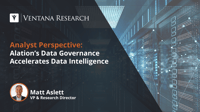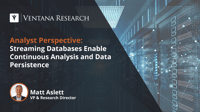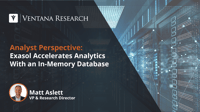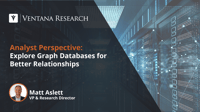As data continues to grow and evolve, organizations seek better tools and technologies to employ data faster and more efficiently. Finding and managing data remains a perennial challenge for most organizations, and is exacerbated by increasing volumes of data and an expanding array of data formats. At the same time, organizations must comply with a growing list of national and regional rules and regulations, such as General Data Protection Regulation and the California Consumer Privacy Act....
Read More
Topics:
Data Governance,
Data Management,
Data,
data operations
Success with streaming data and events requires a more holistic approach to managing and governing data in motion and data at rest. The use of streaming data and event processing has been part of the data landscape for many decades. For much of that time, data streaming was a niche activity, however, with standalone data streaming and event-processing projects run in parallel with existing batch-processing initiatives, utilizing operational and analytic data platforms. I noted that there has...
Read More
Topics:
Analytics,
Data,
Digital Technology,
Streaming Analytics,
Analytics & Data,
Streaming Data & Events,
analytic data platforms,
Operational Data Platforms
I have previously written about the importance of data democratization as a key element of a data-driven agenda. Removing barriers that prevent or delay users from gaining access to data enables it to be treated as a product that is generated and consumed, either internally by employees or externally by partners and customers. This is particularly important for organizations adopting the data mesh approach to data ownership, access and governance. Data mesh is an organizational and cultural...
Read More
Topics:
Cloud Computing,
Data Governance,
Data Management,
Data,
Digital Technology,
data operations,
Analytics & Data
I recently wrote about the potential use cases for distributed SQL databases as well as techniques being employed by vendors to accelerate adoption. Distributed SQL is a term that is used by several vendors to describe operational data platform products that combine the benefits of the relational database model and native support for distributed cloud architecture, including resilience that spans multiple data centers and/or cloud regions. I noted that compatibility with existing database tools...
Read More
Topics:
Cloud Computing,
Data,
Digital Technology,
Analytics & Data,
Operational Data Platforms
Organizations require faster analytics to continuously improve business operations and stay competitive in today’s market. However, many struggle with slow analytics due to a variety of factors such as slow databases, insufficient data storage capacity, poor data quality, lack of proper data cleansing and inadequate IT infrastructure. Challenges such as data silos can also decrease operational efficiency. And as the data grows, performing complex data modelling becomes challenging for users as...
Read More
Topics:
Data Management,
Data,
analytic data platforms
I have previously written about the functional evolutionand emerging use cases for NoSQL databases, a category of non-relational databases that first emerged 15 or so years ago and are now well established as potential alternatives to relational databases. NoSQL is a term that is used to describe a variety of databases that fall into four primary functional categories: key-value stores, wide column stores, document-oriented databases and graph databases. Each is worthy of further exploration,...
Read More
Topics:
Data,
Operational Data Platforms
















